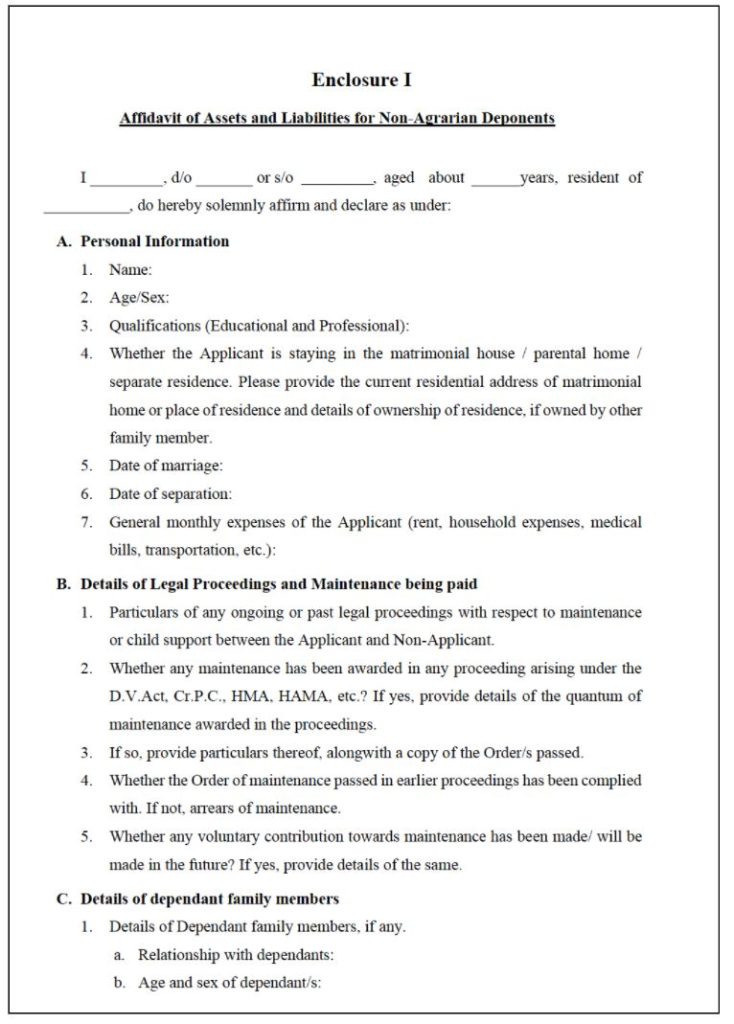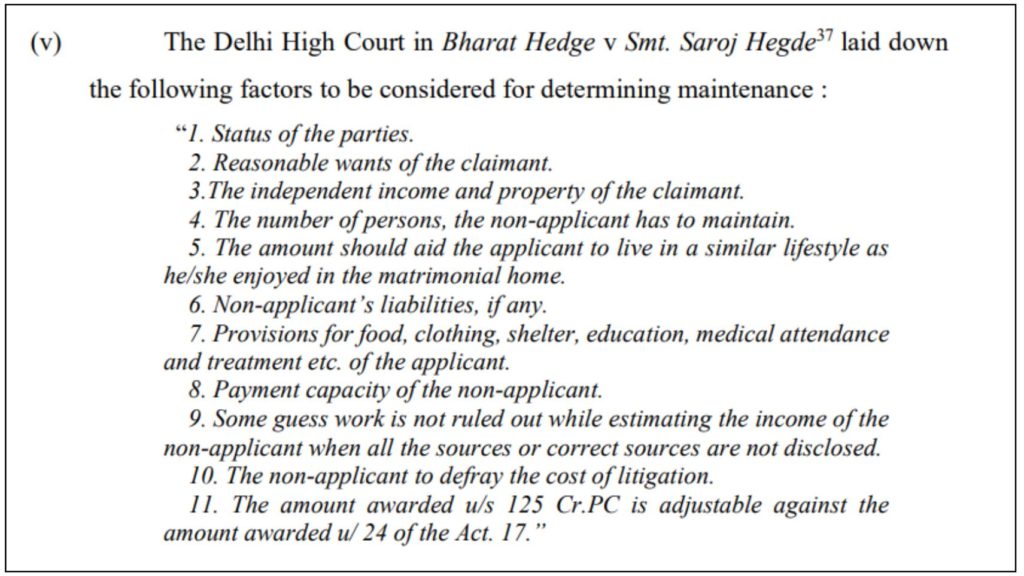While hearing an appeal on an issue related to grant of maintenance, the Supreme Court recently laid down guidelines for lower courts to decide on such cases. Among other things, the SC directed that information be filed by both parties in a prescribed format. Here is a review of these guidelines.
Maintenance usually refers to the right to be supported and taken care of. Sometimes, it is used as a synonym for spousal support or alimony. There are different legal statutes in India which grant persons including wife, children, and parents, the right to claim maintenance for taking care of their necessities such as food, shelter, and clothing, in case a person who has sufficient means refuses or neglects to do so. Maintenance laws in case of matrimonial issues are a measure of social justice that would give dependent wives and children an option to get financial support from the husband so that they do not fall into destitution and vagrancy. Article 15 (3) of the Indian Constitution gives State the power to make special legislations that safeguard the interests of women and children.
Multiple legislations address the issue of maintenance
Multiple legislations have been framed regarding the issue of maintenance of women and children. The first three of the following list are applicable irrespective of the religious community they belong to. Just like the marriage laws, custody and maintenance are also dictated by the religion and hence depend on the personal laws.
1. The Special Marriage Act, 1954
Under section 36 of this Act, a wife is entitled to claim a temporary alimony to support her and for her legal expenses provided she shows that she does not have an independent source of income. Section 37 provides for permanent alimony. The Court decides the amount based on husband’s income.
2. Section 125 of the Code of Criminal Procedure
The statute provides for immediate relief to applicant provided the husband has sufficient means and he ‘neglects’ to maintain his wife who is dependent on him.
3. Protection of Women from Domestic Violence, 2005
Section 2 (a) provides relief to any woman who is or has been in a domestic relationship with an adult male and alleges that she has been subjected to domestic violence. Domestic relationship covers mothers, daughters, sisters, wives, or live-in partners, as the definition refers to any woman who has lived with the person at any point of time.
4. Personal laws applicable to various religious communities ( Examples- The Hindu Maintenance and Adoption Act, 1956 (HAMA), The Muslim Women (Protection of Rights] on Divorce) Act 1986 (MWA), etc.) For instance, under HAMA, a Hindu wife has the right to claim for separate residence and maintenance. Under MWA, the wife is entitled to maintenance from husband for food, lodging even if she is capable of maintaining herself for a period of two years.
Women are often left destitute despite being entitled to maintenance by law
Despite the existence of such provisions, women are often left destitute with their children after a broken or bad marriage for many years. Though there is stipulated timeframe under the statutes for disposal of interim applications of maintenance, it has been observed by the Supreme Court (SC) that in vast majority of the cases, the time frames are not followed.
SC laid out guidelines for uniformity when addressing issues pertaining to maintenance pleas
In the case of Rajnesh Vs Neha, a Family Court in 2015 had directed the husband to pay an interim maintenance of Rs.15,000 per month from 1 September 2013 and Rs.5000 per month for their child for two years and Rs.10,000 per month till further orders. Challenging this order, the husband filed an appeal before the Bombay High Court which dismissed his petition and affirmed the directions of the Family Court. The husband then approached the SC stating that he was unemployed and was not in a position to pay maintenance to his wife. The SC affirmed the earlier judgement and the order of family court for payment of interim maintenance and asked the husband to pay the arrears.
During the hearing of this plea, the SC noted that the application for interim maintenance was pending for 7 years. Usually, the maintenance cases are to be settled within 60 days. Furthermore, it noted that the wife had to move applications multiple times. Noting these difficulties, the SC laid down guidelines for family courts and magistrates to adhere to when hearing the applications of women claiming maintenance from their estranged husbands. These guidelines aim to assure uniformity and consistency when deciding on such cases. These guidelines also ensure that husbands abide by the judicial orders for grant of maintenance. Otherwise, they are liable to punishment. The same is applicable in the case of couples living together for years.
Maintenance is to be granted from the date of application
As per the guidelines by the SC, the maintenance should be granted from the date of application. It was further observed that in such cases, there was tendency from the husband’s side to conceal his actual income while the wife exaggerated her needs. Thus, both the applicant wife and the husband should disclose their assets and liabilities in the prescribed format. The guidelines have annexed copies of Affidavit of Disclosure of Assets and Liabilities that must be filled for all maintenance proceedings before the concerned court. If false cases or misrepresentations are made, section 340 of CrPC will be invoked.

Both the parties should disclose their income and liabilities
To determine the quantum of maintenance, a slew of parameters need to be considered so as to arrive at an amount which is bearable for the respondent and sufficient for the wife. According to the SC, the objective of granting alimony or maintenance is to ensure that the dependent spouse is not left helpless on account of broken marriage and not as a punishment to the other spouse. However, the husband’s plea that he does not have any income does not absolve him of his moral duty to maintain his wife as long as he is able-bodied and has educational qualification, as stated in Manish Jain v Akanksha Jain, 2017. In addition to the parameters given below, age and employment of the parties, right to residence of the wife, her income, and health of spouse, child, and dependent relatives will be considered.

Duration of marriage should also be taken into consideration
The Court adding that several marriages do not last for a reasonable length of time in contemporary society, it is not equitable for the husband to pay his wife permanent alimony for the rest of her life. Hence, the duration of marriage must be taken into account while determining permanent alimony. The expenses of children such as their education, basic needs, vocational training, medical expenses, etc. are to be borne by the father. If the mother is working and earning sufficiently, the expenses may be shared proportionately between them.
Featured Image: Maintenance to Wife and Children


